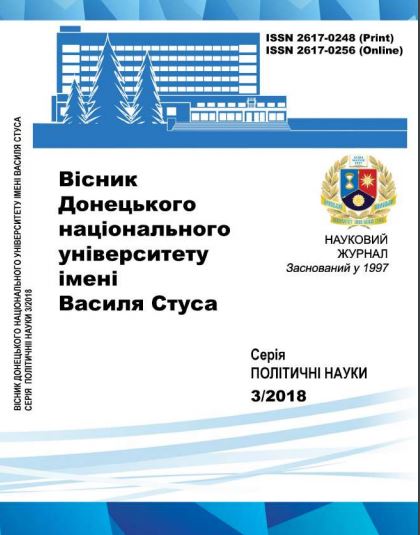Biopolitical paradigm as the basis for the formation of the political context of the model of language policy of Ukraine.
DOI:
https://doi.org/10.31558/2617-0248.2018.3.4Keywords:
neobechhevorizm, prorussian, biopolitical paradigm, Ukraine, political science context, model, postbayhevorizm, linguistic politics, behaviorismAbstract
The biopolitical paradigm is studied as the basis for the formation of the political context of the model of language policy. It is noted that the biopolitical paradigm is based on such concepts as behaviorism, neobechhevorizm and postbiheviorizm, which are used to study the behavior of subjects of language policy, understanding of language policy as a problem, its analysis and evaluation of the language and political situation that is positively or negatively affects the formation of the linguistic environment, the community, its development and the state as a whole. It is stated that the biopolitical approach made it possible to focus on the political culture and symbolic behavior of politicians who develop linguistic bills, programs, complex measures, make suggestions during their discussion and make the necessary decisions that one way or another influence the implementation of language policy, quality of life and community behavior. An attempt has been made to prove that behavioral, non-ihivorous and post-bayhevorist theories are the basis of the formation of a biopolitical paradigm, which allows us to plunge into the essence of language policy as a model, to analyze its essence, content, meaning and development. It is argued that the biopolitical paradigm is based on a behavioral research method that reflects inter-governmental relations, the relationship between Russian and Ukrainian authorities, as well as between them and the Ukrainian community. The definition of the concept of "paradigm", which the author understands as a set of cognitive principles and techniques that reflect the linguistic-political reality and language-political problem, which, in our understanding, is the political context of language policy as a model that is investigated with the help of post-bestialism, that is, , behavioral direction. It analyzes the behavior of the Russian authorities, which interferes in Ukraine's internal affairs, and pro-Russian-minded politicians, which it uses to implement its plans and protect its own interests.References
Денисюк С. Культурологічні виміри політичної комунікації: Монографія. – Вінниця: ВНТУ, 2012. – 392 с.
Кресіна І. Українська національна свідомість і сучасні політичні процеси: (Етнополітичний аналіз): [Монографія]. – К.: Вища школа, 1998. – 392 с.
Лук’янець В. Парадигма // Філософський енциклопедичний словник Національної Академії наук України. Інститут філософії Г. С. Сковороди / Голова редколегії В. І. Шинкарук. – Київ: «Абрис», 2002. – 742 с.
Національна безпека України 1994-1996 рр.: Наук. доп. НІСД / Редкол.: О. Ф. Бєлов (голова) та ін. – К.: НІСД, 1997. – 197 с.
Новий словник іншомовних слів: близько 40000 сл. і словосполучень / Л. І. Шевченко, О. І. Ніка, О. І. Хом’як, А. А. Дем’янюк; За ред. Л. І. Шевченко. – К.: АРІЙ, 2008. – 672 с.
Обушний М., Коваленко А., Ткач О. Політологія: Довідник / За ред. М. І. Обушного. – К.: Либідь, 2009. – 501 с.
Політологічний словник: Навч. посіб. для студ. вищ. навч. закл. / За ред. М. Ф. Головатого та О. В. Антонюка. – К.: МАУП, 2005. – 792 с.
Політологія: навчальний енциклопедичний словник-довідник для студентів ВНЗ I-IV рівнів акредитації / За наук. ред. політ. н. Н. М. Хоми [В. М. Денисенко, О. М. Сорба, Л. Я. Угрин та ін.]. – Львів: «Новий Світ. – 2000», 2014. – 779 с.
Політологія: сучасні терміни і поняття. Короткий навчальний словник-довідник для студентів ВНЗ I-IV рівнів акредитації. – 4-те видання, виправлене і доповнене / укладач В. М. Піча, наук. редакція Л.Д.Климанської, Я. Б. Турчин, Н. М. Хоми. – Львів: Новий Світ. – 2000, 2015. – 516 с.
Руда О. Мовне питання як об’єкт маніпулятивних стратегій у сучасному українському політичному дискурсі: монографія / Олена Руда; НАН України, Ін-т укр. мови. – К., 2012. – 232 с.
Рупташ О. Парадигмальний підхід у гуманітарних науках // Нова парадигма: [журнал наукових праць] / голов. ред. В.П.Бех; Нац.пед. ун-т імені М.П. Драгоманова; творче об’єднання «Нова парадигма» – Вип. 122. – К.: Вид-во НПУ імені М.П.Драгоманова, 2014. – С.20-32.
Северинюк В. Політична поведінка: проблеми теорії та методології: монографія. – Київ; Запоріжжя: Вид-во КПУ, 2009. – 432 с.
Сучасна політична лексика: енциклопедичний словник-довідник / [І. Я. Вдовичин, Л. Я. Угрин, Г. В. Шипунов та ін.]; за наук. ред. Хоми Н. М. – Львів: «Новий Світ - 2000», 2015. – 396 с.
Трибушний О. Мовна політика в Україні: проблеми і пріоритети // Віче. – Київ, 1997. – №9 (66). – С. 99-107.
Чередник Ю. Модернізація державної мовної політики в Україні: теоретико-методологічний аспект: Автореф. дис. ... канд. наук з державного управління: 25. 00. 01 / Дніпропетровський регіональний інститут державного управління Національної академії державного управління при Президентові України. – Дніпропетровськ, 2011. – 23 с.
Bimber B. Political Communication in the 2000 Election: Guest Editor's Introduction [Text] / B. Bimber // Political Communication. – 2002. – Volume 19. – Issue 1. – P. 1-3.
Bowring B. The Russian language in Ukraine: complicit in genocide, or victim of state-building? [Text] / Ryazanova-Clarke L. // The Russian Language Outside the Nation Speakers and Identities. Studies in Social Interaction EUP. – Edinburgh, Scotland: Edinburgh University Press, 2014. – P. 56-80.
Zhulynsky M. Cultural, educational and linguistic policy in Ukraine, 1991–1996 // In Towards a New Ukraine I: Ukraine and the New World Order 1991–1996. – Proceedings of a Conference held at the University of Ottawa, 1997. – March P. 21–22.

